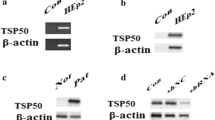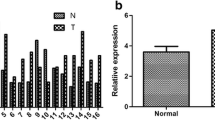Abstract
Testes-specific protease 50 (TSP50) is a potential cancer-associated gene that may be involved in human laryngocarcinoma. The present study aimed to investigate suppressive effects on the HEp2 human laryngocarcinoma cell line by transfection with TSP50-specific short hairpin RNA (shRNA). Western blot analysis was used to detect the expression levels of TSP50. MTT assay was used to evaluate cell proliferation. Wound healing was used in cell migration and invasion assays to evaluate the cell exercise capacity. Nuclear staining assay was used to evaluate cell apoptosis after knockdown of TSP50. Expression levels of TSP50 protein in the shRNA group were downregulated successfully by transfection, and the knockdown of endogenous TSP50 in HEp2 cells greatly inhibited nuclear factor κB (NF-κB) activity. MTT results showed that the cell proliferation in the shRNA group was significantly more depressed than that in the blank (P < 0.05) and negative control groups (P < 0.05). Additionally, a decreased number of migrated cells in the shRNA group was observed (P < 0.05) using a cell migration and invasion assay. Moreover, knockdown of endogenous TSP50 expression can induce apoptosis in HEp2 Cells. These data indicated that knockdown of TSP50 may cause inhibition of proliferation, migration, and invasion of HEp2 cells. This study provides a new perspective in understanding the molecular mechanisms underlying the progression of laryngocarcinoma and offers a potential therapeutic target for laryngocarcinoma.







Similar content being viewed by others
References
Parker SL, Tong T, Bolden S, Wingo PA. Cancer statistics. CA Cancer J Clin. 1997;47:5–27.
Siegel R, Naishadham D, Jemal A. Cancer statistics. CA Cancer J Clin. 2013;63:11–30.
Yuan L, Shan J, De Risi D, Broome J, Lovecchio J, Gal D, et al. Isolation of a novel gene, TSP50, by a hypomethylated DNA fragment in human breast cancer. Cancer Res. 1999;59:3215–21.
Shan J, Yuan L, Xiao Q, Chiorazzi N, Budman D, Teichberg S, et al. TSP50, a possible protease in human testes, is activated in breast cancer epithelial cells. Cancer Res. 2002;62:290–4.
Song ZB, Bao YL, Zhang Y, Mi XG, Wu P, Wu Y, et al. Testes-specific protease 50 (TSP50) promotes cell proliferation through the activation of the NF-kappa beta (NF-kappaB) signaling pathway. Biochem J. 2011;436:457–67.
Li YY, Bao YL, Song ZB, Sun LG, Wu P, Zhang Y, et al. The threonine protease activity of testes-specific protease 50 (TSP50) is essential for its function in cell proliferation. PLoS One. 2012;7:e35030.
Xu H, Shan J, Jurukovski V, Yuan L, Li J, Tian K. TSP50 encodes a testis specific protease and is negatively regulated by p53. Cancer Res. 2007;67:1239–45.
Zhou L, Bao YL, Zhang Y, Wu Y, Yu CL, Huang YX, et al. Knockdown of TSP50 inhibits cell proliferation and induces apoptosis in P19 cells. IUBMB Life. 2010;62:825–32.
Zheng L, Xie G, Duan G, Yan X, Li Q. High expression of testes-specific protease 50 is associated with poor prognosis in colorectal carcinoma. PLoS One. 2011;6:e22203.
Zhang Y, Zhou L, Bao YL, Wu Y, Yu CL, Huang YX, et al. Butyrate induces cell apoptosis through activation of JNK MAP kinase pathway in human colon cancer RKO cells. Chem Biol Interact. 2010;185:174–81.
Zhang Y, Bao YL, Yang MT, Wu Y, Yu CL, Huang YX, et al. Activin A induces SLC5A8 expression through the Smad3 signaling pathway in human colon cancer RKO cells. Int J Biochem Cell Biol. 2010;42:1964–72.
Melo SA, Ropero S, Moutinho C, Aaltonen LA, Yamamoto H, Calin GA, et al. A TARBP2 mutation in human cancer impairs microRNA processing and DICER1 function. Nat Genet. 2009;41:365–70.
Doerfler W, Hohlweg U, Müller K, Remus R, Heller H, Hertz J. Foreign DNA integration—perturbations of the genome—oncogenesis. Ann N Y Acad Sci. 2001;945:276–88.
Brummelkamp TR, Bernards R, Agami R. A system for stable expression of short interfering RNAs in mammalian cells. Science. 2002;296:550–3.
DiDonato J, Mercurio F, Rosette C, Wu-Li J, Suyang H, Ghosh S, et al. Mapping of the inducible IκB phosphorylation sites that signal its ubiquitination and degradation. Mol Cell Biol. 1996;16:1295–304.
Lallena MJ, Diaz-Meco MT, Bren G, Payá CV, Moscat J. Activation of IκB kinase β by protein kinase C isoforms. Mol Cell Biol. 1999;19:2180–8.
Sgambato A, Cittadini A, Faraglia B, Weinstein IB. Multiple functions of p27 (Kip1) and its alterations in tumor cells: a review. J Cell Physiol. 2000;183:18–27.
Kothapalli D, Zhao L, Hawthorne EA, Cheng Y, Lee E, Puré E, et al. Hyaluronan and CD44 antagonize mitogen-dependent cyclin D1 expression in mesenchymal cells. J Cell Biol. 2007;176:535–44.
Aggarwal BB. Nuclear factor-κB: the enemy within. Cancer Cell. 2004;6:203–8.
Nakshatri H, Bhat-Nakshatri P, Martin DA, Goulet Jr RJ, Sledge Jr GW. Constitutive activation of NF-κB during progression of breast cancer to hormone-independent growth. Mol Cell Biol. 1997;17:3629–39.
Rayet B, Gélinas C. Aberrant rel/nfkb genes and activity in human cancer. Oncogene. 1999;18:6938–47.
Lee RJ, Albanese C, Fu M, D’Amico M, Lin B, Watanabe G, et al. Cyclin D1 is required for transformation by activated Neu and is induced through an E2F-dependent signaling pathway. Mol Cell Biol. 2000;20:672–83.
Author information
Authors and Affiliations
Corresponding author
Rights and permissions
About this article
Cite this article
Zhang, X. Depression of testes-specific protease 50 (TSP50) inhibits cell proliferation and induces apoptosis in laryngocarcinoma. Tumor Biol. 35, 10781–10788 (2014). https://doi.org/10.1007/s13277-014-2090-y
Received:
Accepted:
Published:
Issue Date:
DOI: https://doi.org/10.1007/s13277-014-2090-y




